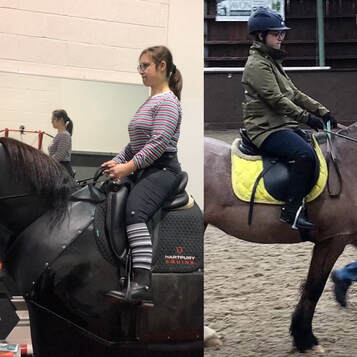
Winnie's story
"The concept of having a mechanical horse to enhance the performance of a rider and learn from is not a new one for me. However, it’s only been in recent years I’ve been able to fully appreciate the versatility of mechanical horses and the wide range of benefits they provide.
I have a neurological disability called Cerebral Palsy which affects my muscles, my overall movement and co-ordination abilities. I also have Fibromyalgia which causes me additional pain and fatigue. I have had varied degrees of movement over the years – but for the most part I use a wheelchair to navigate my life. I use horse riding and also use bespoke Hippotherapy sessions to supplement ‘traditional’ physiotherapy.
My first experience of a mechanical horse was at college; this mechanical horse (who was named Jeanette) had three canter paces and I would ride for about 20 minutes if not longer twice a week being taught by my LSA and improving my overall positioning in the saddle. This was vital in enabling me to see what worked well for my body and we trialled a lot of saddle swapping, stirrup length changes etc which was great as it allowed me to get to know my needs before transferring over to a live horse. I was also able to safely enhance my fine motor skills learning to plait up a mane – which made me practice my standing skills.
Getting stronger
Overall, I became a lot stronger in my core and my position and stamina improved immensely. My muscles began to relax into the motions after a few sessions and my legs appeared to drop and become longer – what was the cause of this? My muscles engaging to support my body movements, very similar to the way we utilise traditional physio train muscles to improve the bodies functions with structured regimes of exercises.
However, what was better about this is that it was all organic and not something I had to think too hard about – Yes, I had body awareness and knew what I needed to do to achieve the result I wanted but it was something that was naturally occurring and not too consuming. I think what made it easier was the fact that me and my LSA were in constant fits of giggles over one thing or another – so much so the entire yard could hear us! My LSA also would let me give her lessons on Jeanette too – I’m not sure I was the kindest teacher forcing her to do rising canter in no stirrups. But nonetheless, cemented the foundation into the positives of mechanical horse.
Hippotherapy
It wasn’t until two years later post- college and a severe decline in my mobility I ventured into the world of Hippotherapy through my now physio Jo McMeechan. Jo is a physio with experience horses and specific training in Hippotherapy and EquestriSEN sessions – using the natural surrounding and play based activities to support the physical, sensory, and mental wellbeing needs of her clients to help facilitate a positive change. Jo works out of an RDA centre at present with use of a walk, trot, extended trot and canter sim which has had the settings adjusted for therapeutic purposes - but her ultimate goal is to be able to have a mechanical horse at her brand-new base of SENSTORY HQ to be able to have a central point for all her clients, this is something we are actively fundraising for to go alongside the four acres and 7 horses that currently reside and thrive at HQ.
Hippotherapy is specific horseback therapy utilising the natural movement of a horse to support and change the postural control of the rider. Each session and its objective are predominantly rider-led and it’s a team effort to work towards that goal in a safe and structured environment.
Typically, we don’t use a saddle or reins as a part of the overall therapy, as a whole range of different movements are used to support the development of postural and balance reactions from the head down. It’s not uncommon to see me sat facing the tail or lying on the horse while its working in a walk pace. Jo and her team of assistants are absolutely lovely and are so dedicated to their profession – which again has instilled in me a sense of accomplishment and their support has helped me with my mental wellbeing.
The long term benefits
The long-term benefits of using a Racewood Simulator have been amazing, I’ve gone from not being able to walk at all as a result of tremors to being strong enough to take a few steps with a walker, all because my muscles have become more engaged and working together at once to improve and support my movement. I have more stamina and can ride at a higher intensity for longer. My riding has greatly improved on a living horse and I’ve seen better reactions and more comfortable responses in the horse I am riding due to postural and positional corrections established overtime while on the simulator.
I’m a great advocate for Racewood Simulators and the opportunities and results they achieve and would recommend if anyone had the chance to try one at any event – to seize the opportunity. It’s not just “sitting on an electrical horse that moves backwards and forwards”, it’s a highly valued piece of kit with a fully immersive experience into your riding abilities and allows for you in such a small amount of time to learn so much about you as a rider. Plus, if you’re lucky you might be able to trial doing Cross Country or a Dressage test!"
If you would like to find out more information about our simulators, find an RDA centre near you, or get in touch with Winnie's physio Jo, please send an email to [email protected] for more information.